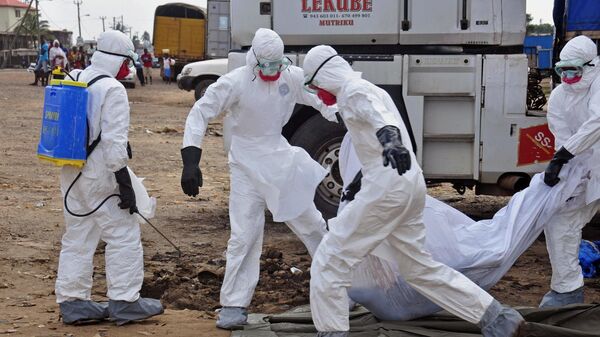When you hear the words "plague", "cholera" or "yellow fever", your first association is probably with the 19th century not with the 21st, with its advanced drugs and medical technologies. Nevertheless, these and dozens of other diseases are still present, some of them have even made the headlines, as various countries around the world periodically suffer from outbreaks.
Anna Popova is the head of Russia's Rospotrebnadzor — the government watchdog agency in charge of consumer rights and protection of citizens' well-being. The agency, along with Russia's foreign ministry and defense ministry, invited dozens of epidemiologists, public health officials and NGO representatives from around the world to a conference in Sochi to discuss a common approach to countering biological threats. According to Popova, the human impact on the environment is one of the reasons why we are seeing the comeback of old diseases:
"Today we are witnessing the unusual behavior of well-known microorganisms: the highly unusual physiological course of Ebola fever, which took more than 10 thousand lives, the atypical course of Zika, which never affected so many patients, as we've seen in the past two years, the non-typical plague cases in Madagascar, which fortunately didn't kill many people, but still has a high lethality. We have to be prepared for all these risks."
READ MORE: Madagascar: 'Low' Risk of Deadly Plague Spreading Globally, WHO Tells Sputnik
For years Russia has been taking steps to improve preparedness for various biological threats. The country's defense ministry and Rospotrebnadzor's own research teams have come up with an idea to deploy mobile laboratories to locations, where outbreaks of diseases or chemical attacks are possible.
Right outside the conference venue,defense ministry and Rospotrebnadzor (watchdog in charge of health/wellbeing) showcase biosec equipment. pic.twitter.com/tuJOSzE6p4
— Denis Bolotsky (@BolotskySputnik) 2 ноября 2017 г.
These autonomous bacteriological labs, which are mounted on KAMAZ off-road trucks and heavy-duty trailers, are capable of detecting up to 300 various pathogens which cause enteric, airborne and anaerobic infections. These labs have already gone through field testing both domestically and internationally — during the 2014 Winter Olympics in Sochi, as well as during Ebola outbreak in the West African Republic of Guinea.
For delegates to the Sochi biosecurity conference, this is a chance to share their views on modern-day threats, which are equally relevant for both developed nations and for countries, which are still on the path to implementing modern disease prevention measures.
However, Mother Nature's "deadly gifts" are not the only evils that modern-day scientists are facing. Recent "quantum leaps" in science and technology, genetic modification experiments, along with the appearance of new "dual-use" biological agents bring about new challenges.
Doctor Filippa Lentzos is a senior research fellow at London's King's College, and a moderator of one of Sochi's plenary sessions. She says that the conference plays an important role, since it brings together people from different groups — government officials, international organizations and civil society, and helps them to engage in a dialogue, no matter how different their priorities might be:
Zoom 00:10 00:57 Some of the areas that I'm particularly concerned with relate to gene editing technologies, synthetic biology, potentially pandemic pathogens, which are enabling us to genetically modify pathogens, which in future might enable us to synthetically construct dangerous pathogens. To some extent this is starting to happen already. Another area relates to delivery mechanisms — something in particular around drones.
READ MORE: Nine Countries in Danger as Unusually Severe Plague Hits Madagascar
In the 1970s the Soviet Union, United States and the UK ratified the Biological and Toxin Weapons Convention — the first multilateral treaty which banned the production and the use of bioweapons by participating nations. Currently, a total of 179 countries have ratified the document. According to Russia's deputy foreign minister Sergei Ryabkov, Moscow is constantly looking for new ways to improve the convention and recently made a proposal to use Russia's experience and technology of mobile medical and biological units, which could come to the rescue in the event of an attack anywhere in the world:
"If a country has become victim of biological weapons — and we cannot rule out such an occurrence — these mobile units, which rely on Russian technologies, could directly assist a country in containing the outbreak and in investigating its causes."
The Sochi conference has provided experts on biological security with a chance to discuss a range of legal and technological issues. In December of this year the signees of the Bioweapons convention, including Russia, will gather in Geneva to hold further talks.





